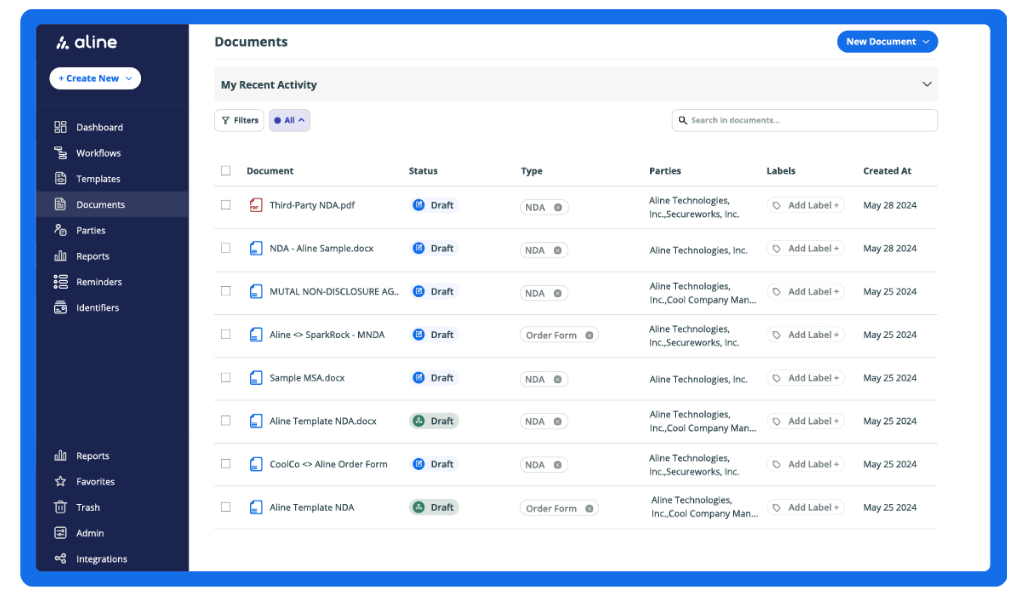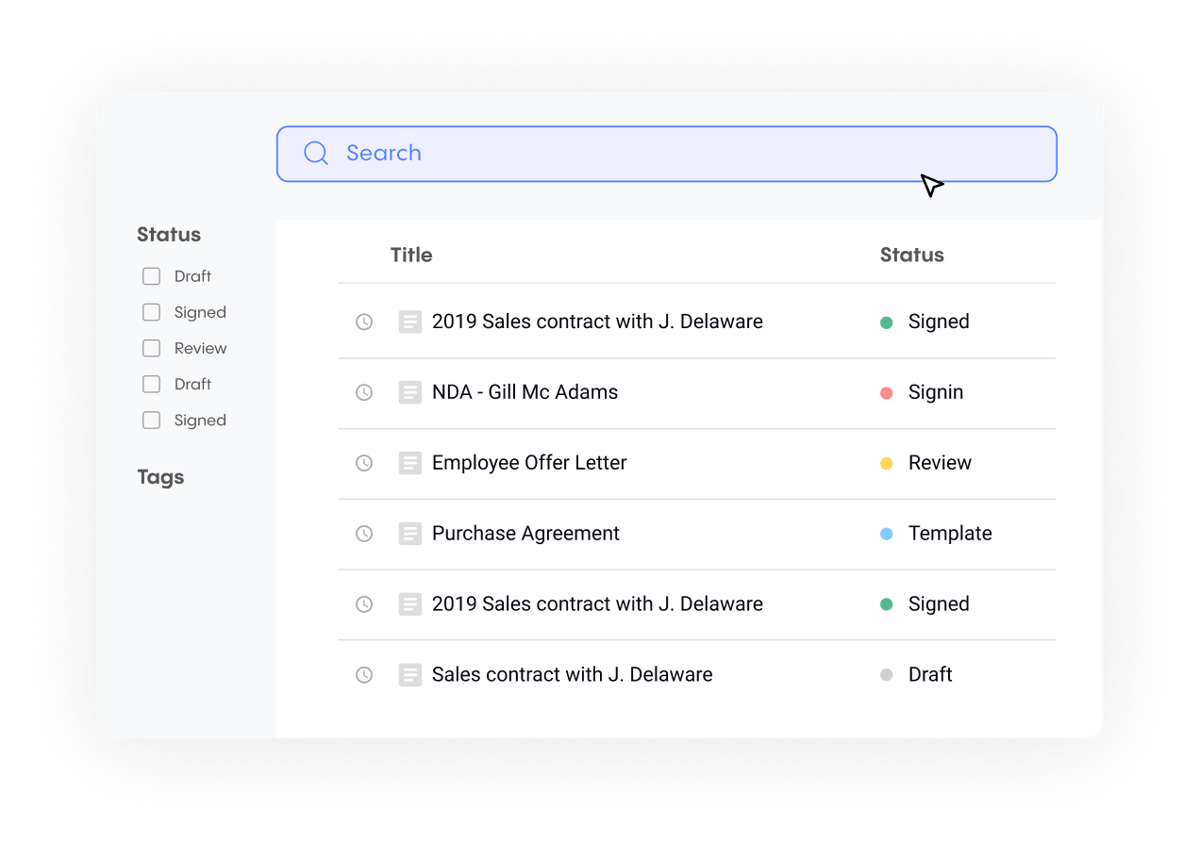
NEW
AI Repository just launched this week! Try out the new features.
Budgets are tight. Teams are stretched. And yet, contracts keep piling up. Whether it’s a vendor agreement or that 50-page deal sitting in your inbox, the way you manage contracts can make or break efficiency.
That’s why many companies turn to contract management software, but the real question isn’t if you should use it. It’s how much it’s going to cost. And here’s the tricky part: no two providers price their tools the same way.
This article breaks down the factors that shape contract management software pricing, the common models you’ll run into, and what you actually get for your money.
We’ll also compare three well-known CLM providers (Aline, Concord, and HyperStart CLM) so you can see how pricing aligns with features and decide which one makes sense for your business.
The price you’ll pay for contract management software depends on several key factors. While most contract management software offers flexible pricing plans, the total cost can vary a lot based on how your company handles and grows its contracts.
Here are the main points to consider:
Choosing the right contract management software means looking beyond the sticker price. With that in mind, think about how well it fits your team’s way of managing contracts today and how it will scale tomorrow.
Now that you know what shapes the cost, it helps to look at how vendors actually structure their offers. Most contract management software pricing falls into a few common models, each with its own trade-offs.
This is one of the most common pricing models. You pay a set subscription fee for each person using the system.
It’s simple to calculate and works well for small businesses, but costs can rise quickly as you add additional users or expand into scaling teams.
Many platforms offer multiple levels, often starting with an essentials plan for basics like storing contract documents and handling a straightforward contracting process.
As you move up, higher tiers unlock advanced features such as AI review, compliance tools, or reporting for complex agreements.
For larger organizations, the price is often customized after discussions with a sales team. These packages usually cover broader needs, deeper integrations, and may include additional costs for setup or dedicated support.
It’s flexible, but harder to compare across vendors.
With so many pricing models out there, it helps to see how different tools actually line up in practice. Below is a quick look at three contract management software solutions that each sit at a different price point.
This way, you can see how pricing plans vary depending on features, team size, and the kind of support you need.
Aline is a contract management software solution specifically built to simplify the entire contract lifecycle. Instead of bouncing between tools for drafting, approvals, and signatures, you get everything you need in one easy-to-use platform.
From contract creation to analysis, Aline gives you better contract visibility and keeps your team focused on the more important parts of the contract management workflow.

Where it really shines is in its AI capabilities. Drop in a long agreement and get a clean redline back in minutes.
For teams dealing with complex contracts, that kind of speed can turn hours of review into a quick check, cutting out bottlenecks and helping decisions move forward faster.
You’ll also find automated workflows that keep sales, legal, and operations teams on the same page.
Add unlimited electronic signatures, SOC II–certified compliance, and integrations that let you connect seamlessly with other tools, and you’ve got one of the best contract management software options available today.
Aline’s pricing starts at $100 per user per month for the annual plan, which makes it a great option for startups while still being powerful enough for larger teams.
Plus, plans scale based on features and usage, with AI tools, workflows, and unlimited e-signatures included. See Aline for yourself today!
Concord is a contract management software solution that, like many, aims to make the contract management process more straightforward.
Basically, it gives teams a central platform for drafting, signing, and managing agreements, without relying on scattered email threads or manual tracking.

The platform focuses on core features like document management, version control, and automated alerts for important renewal dates. These tools help reduce missed deadlines and lower legal risks, while keeping the workflow easy to follow.
Concord also integrates with existing tools to cut down on manual data entry and make it easier for teams to track contract data and make more informed decisions about their agreements.
While it doesn’t have advanced AI or deep contract intelligence, it delivers reliable functionality for businesses that want something simple and practical.
HyperStart CLM is built with startups in mind. If you’re running lean and just need a simple way to manage contracts without breaking the bank, this platform keeps things straightforward.
It’s not overloaded with extras. Rather, you get the basics of drafting, signing, and tracking in one place, at a price point that makes sense for smaller teams.

What makes HyperStart stand out is the balance between affordability and function. It offers AI-powered features that help with routine tasks like scanning contract terms or sending renewal tracking reminders.
For businesses moving away from spreadsheets, this means better visibility into agreements and more confident decision-making. And while it doesn’t compete with higher-end systems on complexity, it gives you enough to stay organized and work toward improved compliance.
Looking at the sticker price is just the start. The contract management software cost can include more than the monthly subscription fee.
Depending on the CLM provider and how your business grows, you might run into other charges that affect the total cost of contract management. These are some areas you should keep in mind.
Most providers use user-based pricing, so adding new team members means your bill goes up. As your company scales, you’ll want to factor in the cost of bringing more people onto the platform.
The number of agreements and the contract length can also influence pricing. Some tools limit storage or reporting for very large agreements, which may lead to extra charges if your team handles high-volume or complex deals.
Platforms that include advanced automation capabilities, like AI-driven contract reviews, renewal reminders, or contract workflow automation, may come at a higher tier.
While these features add cost, they often help teams save time and identify opportunities that manual processes miss.
Some vendors include support in the base price, while others charge extra for dedicated help or onboarding.
Consider how much guidance your team will need to keep contracts moving and maintain clear visibility into contract status.
When you think about the cost of contract management, it’s easy to focus on the subscription fee alone. But have you considered how much time your team spends chasing signatures or digging through old files?
Those hidden costs add up quickly, and the right platform can turn all that wasted effort into real efficiency.

The best choice isn’t always the cheapest tool, but the one that gives you the visibility, automation, and confidence your team needs to move faster. That’s exactly where Aline stands out.
With AI-powered contract review, automated workflows, unlimited e-signatures, and seamless integrations, it’s built to handle everything from simple agreements to complex contracts without slowing your business down.
So the real question is, how much more time and money can your team afford to lose sticking with the old way?
Book a demo with Aline today and see how much easier contract management can be.
The price of a contract lifecycle management (CLM) tool varies widely. On average, you’ll see costs ranging from $35 per user per month for entry-level tools up to several hundred dollars for advanced platforms. The total depends on several factors, like features, number of users, and integrations.
The “best” tool depends on your team’s needs. Some businesses prefer feature-rich platforms with AI and automation, while others look for a simple system to handle e-signatures and storage. Aline, for example, is often highlighted as one of the best contract management software solutions thanks to its AI capabilities and unlimited e-signatures.
CMS usually refers to “content management system,” which deals with digital content like blogs or web pages. CLM, or “contract lifecycle management,” is focused on contracts. This type of tool covers contract creation, approvals, signing, and tracking through their entire lifecycle.
How much does contract management software cost overall? Basic systems may run under $50 per user per month, while enterprise-level platforms can reach hundreds. Some providers also offer discounts for annual billing or larger teams, so it’s worth asking about pricing flexibility before committing.

